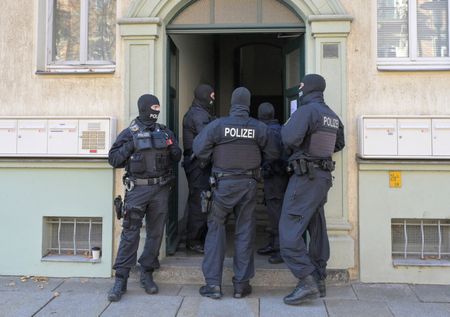By Andrius Sytas
VILNIUS (Reuters) -Parcels that exploded at logistics depots in Europe were part of a test run for a Russian plot to trigger explosions on cargo flights to the United States, according to security officials.
Western governments and intelligence agencies in Europe have previously pointed to Moscow as being the source of a series of fires and acts of sabotage in Europe aimed at destabilising allies of Ukraine.
However, explosions in courier depots in Britain, Germany and Poland this July, which a Lithuanian presidential adviser said were the work of Russia, had the potential to mark a serious escalation by causing an explosion on an aircraft.
“I can state that this is part of unconventional kinetic operations against NATO countries that are being undertaken by the Russian military intelligence,” Kestutis Budrys, a national security adviser to Lithuanian President Gitanas Nauseda, told Reuters on Tuesday.
“We note that these operations are being escalated: their focus is moving… to harming infrastructure and actions that could end up killing people,” he added.
The Russian government did not immediately respond to a request for comment.
The Wall Street Journal on Monday cited Western security officials as saying that the devices that ignited in DHL depots in Birmingham, central England, and Leipzig were part of a Russian operation that was intended to cause fires on cargo or passenger flights to North America.
EXPLODING PARCELS INVESTIGATION
Poland said in October that it had detained four people in an investigation into explosive parcels being sent by courier to EU countries and Britain as part of a plot that ultimately aimed to send such packages to the United States and Canada.
Warsaw blamed foreign intelligence services without specifically naming Russia.
Polish daily Gazeta Wyborcza reported in October that a parcel had caused a fire in a truck at a site belonging to a courier firm near Warsaw and that the exploding parcels in Poland, Germany and Britain had been sent from Lithuania.
Lithuanian Prosecutor General Nida Grunskiene told reporters Vilnius was investigating the parcels and arrests had been made in “Lithuania and elsewhere”.
“Our investigation is ongoing quite intensely, in cooperation with institutions in other countries,” she said. “And at this moment we have people under arrest, but I will not say the number to avoid harm to the investigation.”
The FBI declined to comment. Britain’s Home Office, which is responsible for domestic security, declined to comment.
Britain’s Security Service (MI5) Director General Ken McCallum said in October that Russia’s GRU military intelligence service was trying to cause “mayhem” across Britain and Europe.
Poland said in October it would close the Russian consulate in the western city of Poznan due to suspected Russian attempts at sabotage.
(Reporting by Andrius Sytas in Vilnius, Barbara Erling, Marek Strzelecki, Anna Wlodarczak-Semczuk and Anna Koper in Warsaw, Sarah Lynch and Ted Hesson in Washington, Kate Holton in London, Writing by Alan Charlish, Editing by Angus MacSwan Editing by Alex Richardson)









